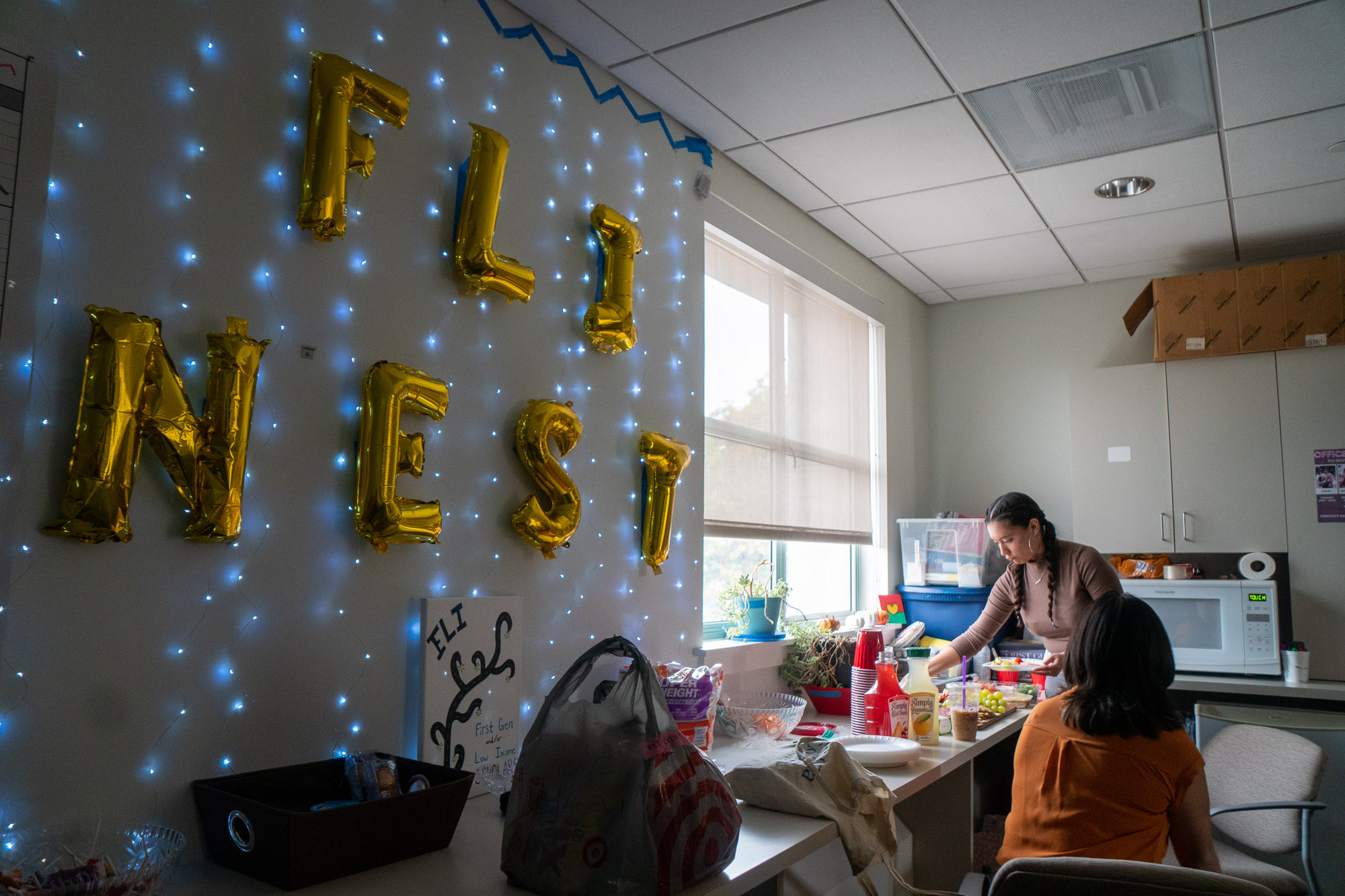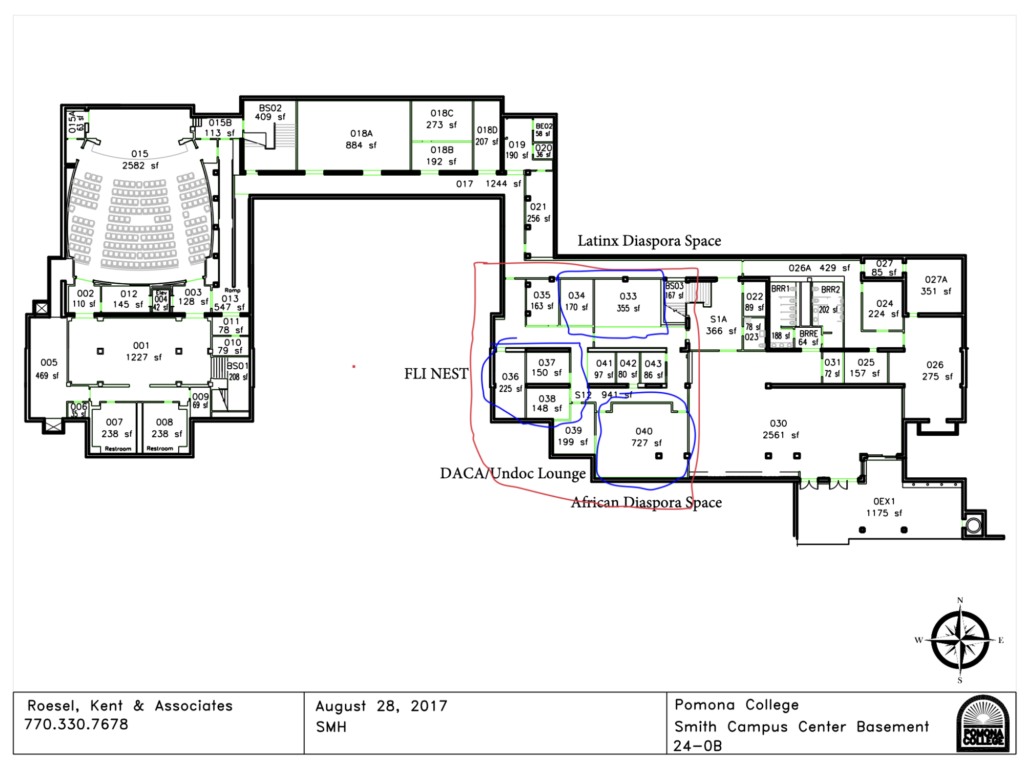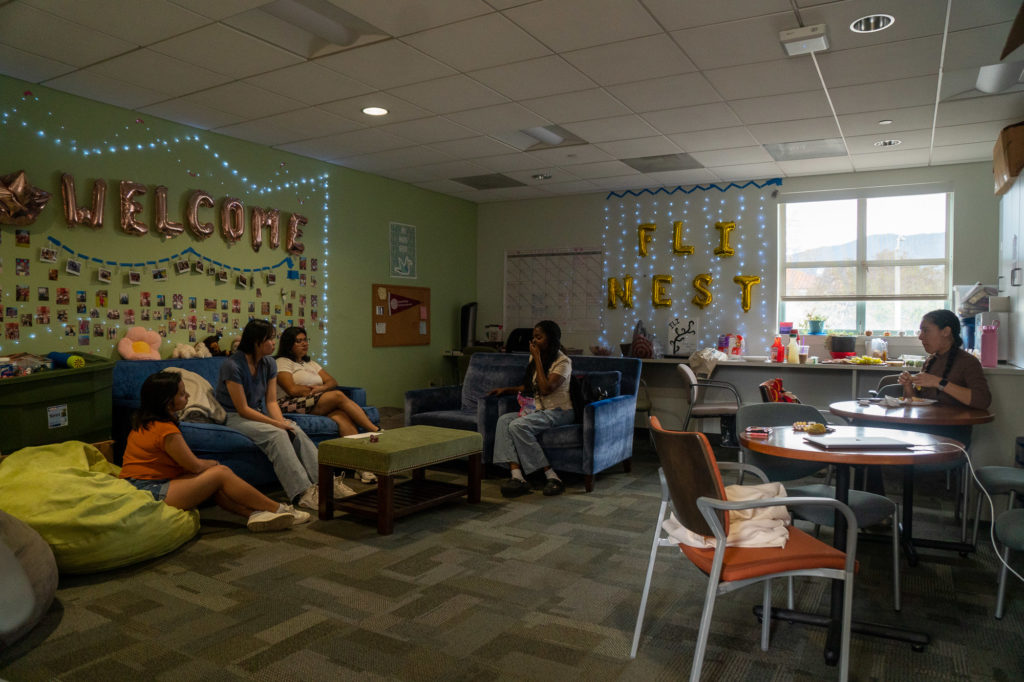
February 27, 2024
Dean Jackson approached groups in November to ask if they wanted to leave their spaces, but said that the decision was already “90% made.”

“Even if we have a 10% chance of keeping this space, it’s something we’re willing to fight for,” Leslie Serna PO ’24, a FLI head mentor, said.
On Wednesday, Nov. 17, 2023, Pomona Dean of Students Brandon Jackson told leaders of affinity groups serving first-generation low-income (FLI), undocumented/DACA-mented (IDEAS), Latinx (LXA), and Black (BSU) students that they would be relocated from their existing spaces to a “cultural hub” in the basement of Smith Campus Center.
LXA and BSU leaders said that they were in favor of the move, as the two groups currently do not have dedicated spaces, with LXA sharing the Students of Color Lounge with other groups.
When leaders for FLI and IDEAS pushed back against moving, however, Jackson told them that the decision was already “90% made” and unlikely to change.
The decision was based on a study conducted by an outside architectural firm to understand “affinity group space utilization and future space values,” according to a Nov. 8, 2023 email from Jackson inviting the groups to meet to discuss the study.
On an initial meeting on Nov. 14, 2023, Jackson told Leslie Serna PO ’24, a FLI head mentor, that the study found that students needed more general study space, and that the old affinity group spaces would be converted to general study spaces.

In a follow-up email on Nov. 17, 2023, Jackson shared a roughly marked-up floor plan with leaders, showing that BSU would be allocated an open 720 square feet space, and LXA two separate rooms, which Jackson later clarified would have walls between them taken down to become one room, totaling 525 square feet, in the basement.
Jackson also told IDEAS leaders that they could stay in their existing space, shared with ISMP in Clark basement, if they wanted to. Alternatively, they could move to a 199-square-foot office in the basement of SCC.
FLI, however, received no option to stay in their existing space on the second floor of SCC. The floor plan showed that they would be allocated three adjacent but walled-off offices, two of them 150 square feet large and one of them 225 square feet large.
According to Pomona’s website, FLI students comprise 18% of the student body.
In the Nov. 14 meeting, Jackson told Serna that he had already spoken with Mariana Acevedo PO ’24, the head mentor for IDEAS, and that IDEAS had already agreed to move to the basement space.
However, Serna and Acevedo were roommates. Upon consulting Acevedo, Serna quickly discovered that what Jackson said wasn’t the case.
“In my head I was laughing, but he was just straight up telling lies, saying that IDEAS was happy about the space and that all the other groups are gonna be so happy to see their spaces,” Serna said.
Word got around, and eventually, leaders of different affinity groups met in the Asian American Mentor Program space on the second floor of SCC. On Nov. 19, leaders from LXA, BSU, FLI, IDEAS, ISMP, and AAMP sent a co-signed email requesting to meet together with Jackson to clarify the relocation plans.

On a Nov. 20, 2023 Zoom meeting with Jackson, leaders from BSU and LXA agreed to move to basement spaces. IDEAS challenged the small size of the space they were allocated, however, worrying that it signaled a larger lack of support for undocumented students from the school.
“The one thing that kind of like bothers me a little bit is them offering us such a small space. Their reasoning is, you guys are a small group, but that’s not our fault [that] the school isn’t admitting undocumented students. And by offering us a small space, you’re saying, in the future, we don’t plan on admitting undocumented students,” said Mariana Acevedo PO ’24, IDEAS Head Mentor.
“That’s a little discouraging and a little like, damn, I wish that there was more hopefulness for actual growth and support from the school or additional resources. But right now it just seems like a downgrade, you know?”
Jackson said that some of the walls between the offices allocated to FLI would be torn down, but that one would remain, still dividing half the room between two 150 square feet spaces.
Though the space was bigger in square footage than the existing FLI nest, Serna said that, upon seeing the space, FLI head mentors realized that the remaining wall would make it difficult to use as a gathering or event space.
“We like did not like it because you get rid of the holiness and the comfortableness of what the FLI nest represents,” Serna said. “Our space would have turned into a U.”
Serna said that the biggest issue that FLI has with moving to the basement, however, is that it would eliminate the visibility of the FLI Nest where it currently is on the second floor of the SCC, and all other affinity groups in the “cultural hub.”
“[We] don’t have visibility there. Like you don’t necessarily know what’s happening in a basement … when you think of a cultural hub, you think of a place where, oh, I can see it, right?” Serna said. “There is some sort of visibility that comes with FLI already being like upstairs that just needs to stay.”
In the beginning of the Nov. 19, 2023 meeting, Jackson said that he was open to hearing what the affinity group leaders had to say. But when Serna pushed back, Jackson said that the plans would not change.
“[Jackson said the decision had] 90% been made. So there wasn’t really much we can say in favor of us keeping the space,” Serna said. “We had told him like, okay, what if we get all these testimonials, what if we get all of our members to say no to moving? Would you reconsider? And he said, no, not really, because again, the decision’s already been made.”
It’s not the first time the college has attempted to alter affinity group spaces without their input. In Nov. 2022, the leaders of LXA and BSU rallied students to oppose the college’s proposal to divide the Clark V basement’s Students of Color Alliance (SoCA) lounge with a wall. The college intended to divide the lounge with a wall to accommodate additional affinity groups, including BSU, despite the lounge already serving six groups.
The dispute between the College and the affinity group leaders escalated to a delegation sit-in, where more than 50 students entered President Gabrielle Starr’s office during her office hours, chanting “Stop the wall” to push their demands and protest against the planned construction. The school eventually canceled plans to build the wall, keeping the space as it was.
Serna said her priority is to spread the word about what happened and rally support to prevent the move to the basement, which is scheduled for fall 2024.
“We’re willing to fight for [our space] and we don’t want our legacy and our chance of visibility to be taken away from us,” she said.


Palestine

Palestine

Palestine

Undercurrents reports on labor, Palestine liberation, prison abolition and other community organizing at and around the Claremont Colleges.

Issue 1 / Spring 2023
Setting the Standard
How Pomona workers won a historic $25 minimum wage; a new union in Claremont; Tony Hoang on organizing
Read issue 1